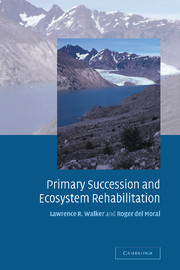Book contents
- Frontmatter
- Contents
- Preface and acknowledgements
- 1 Introduction
- 2 Denudation: the creation of a barren substrate
- 3 Successional theory
- 4 Soil development
- 5 Life histories of early colonists
- 6 Species interactions
- 7 Successional patterns
- 8 Applications of theory for rehabilitation
- 9 Future directions
- Glossary
- Illustration credits
- References
- Index
3 - Successional theory
Published online by Cambridge University Press: 08 January 2010
- Frontmatter
- Contents
- Preface and acknowledgements
- 1 Introduction
- 2 Denudation: the creation of a barren substrate
- 3 Successional theory
- 4 Soil development
- 5 Life histories of early colonists
- 6 Species interactions
- 7 Successional patterns
- 8 Applications of theory for rehabilitation
- 9 Future directions
- Glossary
- Illustration credits
- References
- Index
Summary
Introduction
Succession is as central a concept for ecology as evolution is for biology (Margalef, 1968a). Studies of succession integrate concepts and tools from ecosystem, community, population and organismal ecology, soil science, geology, meteorology, conservation biology and other disciplines. Succession is at once an easily observable phenomenon and an unpredictable puzzle. It has intrigued humans for centuries and has become increasingly relevant as a model for habitat rehabilitation. In this chapter we provide both a history of ideas about succession and an overview of current perspectives, including attempts to describe and predict successional trajectories with conceptual and mathematical models. We trace the development of several sharply contrasting views of succession that have persisted in several forms for the past 100 yr and are still represented in the conflicting modern approaches to succession. This variety of perspectives has considerably enlivened studies of succession and emphasizes that we have yet to understand the complexity that underlies ecosystem development (Anderson, 1986; Weiher & Keddy, 1999).
Most theoretical considerations of succession have addressed secondary succession, but some of these also are applicable to primary succession. Primary succession has played a pivotal role in the study of succession because it represents visually dramatic development following the most extreme disturbances, was the subject of most early studies of succession and is now increasingly relevant for rehabilitation of disturbed lands. In this chapter we assess the relevance of succession to studies of primary succession (cf. Matthews, 1992).
- Type
- Chapter
- Information
- Primary Succession and Ecosystem Rehabilitation , pp. 52 - 87Publisher: Cambridge University PressPrint publication year: 2003



